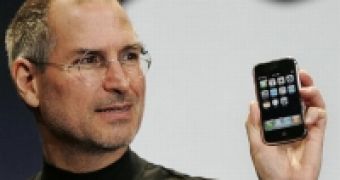When it comes to how successful the iPhone is going to be, there is no middle ground. There are many opinions but they expect it to be either a massive success or a complete flop. While only the sales numbers will bring final and irrefutable proof, several surveys expect it to do very well, including the latest one from Markitecture. If this recent report is to be believed, next year, the iPhone could end up having more market share than Microsoft.
Researchers at Markitecture surveyed 1,300 mobile phone users across the US to reach its projected figures. It found that 77 percent of those spoken with would be at least "slightly familiar" with the iPhone. Also very worthy of a note was the fact that Apple has achieved positive first impressions of the product, and the more a consumer knew about the device, the more favorable their impression of the iPhone actually was. A remarkable 83 percent of those very familiar with the device had "an excellent or very good impression of the product".
Such positive impression of the device could translate into strong sales, and 6 percent of those surveyed described themselves as likely to buy an iPhone in the next year. Not surprisingly, users being on a different network than Apple's chosen partner in the US, AT&T, were the most commonly cited to buy an iPhone.
Microsoft holds a 5.6 percent of the mobile phone market with its Windows Mobile software, and the Markitecture survey shows that Apple could exceed that share within a year of the release of the iPhone. Such a development would be interesting indeed, especially considering Microsoft CEO Steve Ballmer's recent statement. "There's no chance that the iPhone is going to get any significant market share," Ballmer said. "No chance. It's a $500 subsidized item. They may make a lot of money. But if you actually take a look at the 1.3 billion phones that get sold, I'd prefer to have our software in 60 per cent or 70 per cent or 80 per cent of them, than I would to have 2 per cent or 3 per cent, which is what Apple might get."

 14 DAY TRIAL //
14 DAY TRIAL //